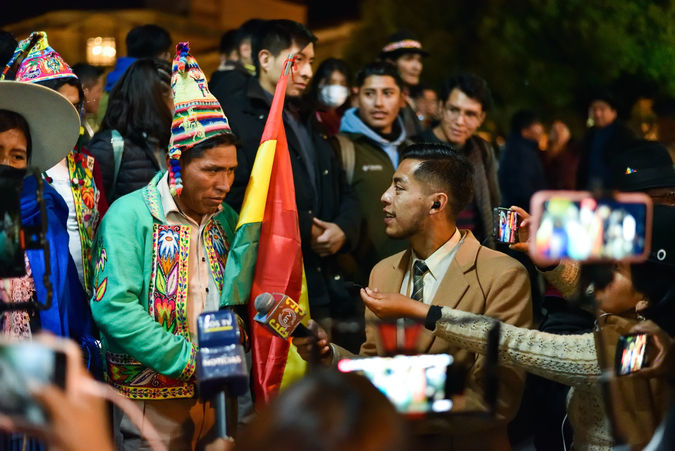essays
Knock Knock, Coup's There
too fine a line between democracy and dictatorship
A knock on the door can mean many things. Usually, it’s not a military coup. But this time it was. I’d never seen Carlos’ eyes that wide open—these days, the sleep and all-else his thesis deprives him of, weigh on his eyelids. But now my Bolivian neighbor looked at me with saucer-pupils that were simultaneously processing and relaying the first-hand emergency news that came in via the cell phone desperately clinging to his ear. “I have bad news,” he said. “There’s a military coup. You better run to the ATM and supermarket right now.”
That I did, with imaginary worst-case scenarios and lots of questions marks tagging along. I found the last ATM without a block-long waiting line and that rattling sound of cash being dispensed had never been more reassuring. Reassuring of what exactly? No idea. No idea what this cash could be good for. For the time being, the two bundles of bills were just two more question marks. By the time I stepped back out onto the street, at least twenty more people had stumbled upon my ATM-gem.
The supermarket was a hectic mess, but fortunately all of us combined were still no match for the colorfully-full shelves, metal meadows where products grew in beautiful abundance. Yet. The register lines snaked around those shelves all the way from the front to the back, and I was lucky to run into Carlos and his brother Sergio who’d already set up camp half-way down one of those waiting lines. Either way, the wait was an excellent opportunity to exchange the latest updates—or lament the dearth thereof—and conduct a little social study via visual probing: significantly more smiles and niceties were being exchanged amid the rush than one might have hypothesized, given that we were suddenly living in a dictatorship under military rule, even if just in our minds or just for an hour. Not a good feeling. Inching towards the cashier at snail-speed, the mind started pacing and using the gut to bounce those ???-marks off it, which left me slightly nauseated, or maybe those were the more factual !!!-marks my empty stomach hurled at me angrily, as though it was my fault we weren’t having lunch. Didn’t help that Carlos answered with “no, never” when I asked him whether he’d experienced something like this before. “Only my parents,” he said, “and it was not good.” OK. Cool. At least there was hope encoded in the preliminary statistical results of my study: zero people utilized elbows to get what they wanted or needed, and zero stampedes within sight. In the end, it was a mild wait compared to what started conspiring outside. By the time we left, people were lining up all the way down the block just to enter.
Drop off groceries. Running on fumes. Looks like midnight lunch today. Storm back out, armed with camera and determination. Supermarket line snap snap, ATM line snap snap, battery empty, oh snap. Sprint back home. Charge a little. Run a sprint-marathon to the presidential palace at Plaza Murillo. Never been happier about being too late. Coup failed. Military bye bye. Democracy yay!
Facing off against army chief Zúñiga, President Arce had called upon the Bolivian people for support, and they had answered his call in masses. Masses that were still there when I arrived and would keep up their vigil long after I left.
It was moving and encouraging all the way down to the bottom of the heart and then some to see crowds and activist groups upholding and celebrating democracy right outside the presidential doorstep—a scarred door the military had slammed with a tank. Fierce speeches by local community leaders brought the simmering cheers and chants to a boil—a blistering, unequivocal civil declaration to stand up to the military and guard democracy with their lives. ¡Qué viva la democracia!
Can I get lunch now?


























